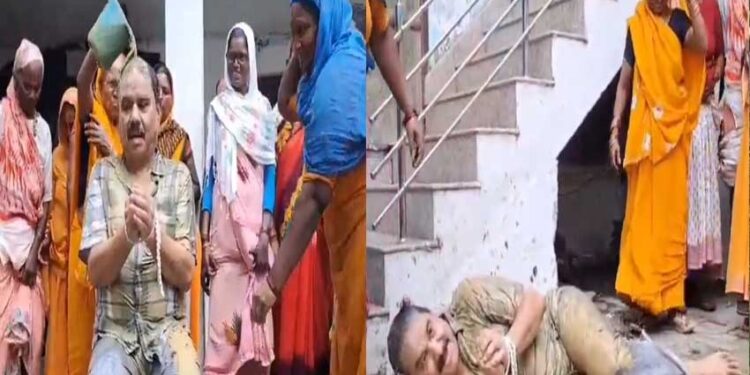Gajanan Madhav ‘Muktibodh’ (English: Gajanan Madhav Muktibodh, born: November 13, 1917 – death: September 11, 1964) is famous as a progressive poet. Muktibodh was the top personality of the post-independence progressive poetry stream of Hindi literature. Muktibodh, who was at the center of most discussion in Hindi literature, was both a storyteller and a critic. He is also considered a bridge between progressive poetry and new poetry.
Muktibodh became a phenomenon in the Hindi world. Some such incident from which it was impossible to turn a blind eye. His single-minded struggle, his unwavering truth, his entire life, all came together on the center stage of our emotions and made us see his poethood in a new light. What kind of life was that and why did it end like this? And why has he been deprived of proper fame till now? This harsh comment is of Shamsher Bahadur Singh, which he has made in a very bold manner on the indifference of the litterateurs of the Hindi world.
Gajanan Madhav ‘Muktibodh’ was born on November 13, 1917 in Sheopur (Gwalior). His early education took place in Ujjain. Muktibodh ji’s father was an inspector of the police department and he was often transferred. That is why Muktibodh ji’s studies were hampered. B.A. from Holkar, Indore in 1938. After this he became a teacher in the Modern School of Ujjain.[2] One of his classmates was Shantaram, who was posted on patrolling duty. Gajanan would go out with him for a stroll in the city at night. Probably the habit of smoking beedi started from then onwards.
His father Madhav Muktibodh also spoke fluent Urdu. He retired from the post of Inspector in Ujjain after serving as Police Station Officer at many places. Muktibodh’s mother was from Bundelkhand, from a farmer family of Isagarh. Gajanan has four brothers. Sharat Chandra, younger than him, is a renowned Marathi poet. Despite family disagreements and opposition, he had a love marriage with Shanta in 1939.
Muktibodh ji started teaching at a young age in the middle school of Badnagar. In 1940, Muktibodh became a teacher at Sharda Shiksha Sadan in Shujalpur. After this, he worked in places like Ujjain, Calcutta, Indore, Bombay, Bangalore, Banaras and Jabalpur etc. When this Sharda Shiksha Sadan was closed during the movement of 1942, this Shiraza was scattered. Muktibodh went to Ujjain. Did different jobs – from master’s to air force, journalism to party. Came to Nagpur in 1948. Worked in Information and Publication Department, All India Radio and ‘Naya Khoon’. Finally, he also wrote textbooks for a few months. Finally, from 1958, he became a professor in Digvijay College, Rajnandgaon. He has written that:-
Gajanan’s classmate friends included romantic fantasy poet Virendra Kumar Jain and Prabhagchandra Sharma, co-editor of Anantar ‘Karmaveer’ and a good, capable poet of that time. Ramashankar Shukla ‘Hriday’ had encouraged Gajanan a lot towards poetry. His poems were being published in ‘Karmaveer’. The mystical style of Makhanlal and Mahadevi attracted the young hearts of Malwa, but Muktibodh remained no less engrossed in Dostoyevsky, Flaubert and Gorky.
Nemichand Jain had reached Shujalpur from Agra. Prabhakar Machwe would also come often. The basic concept of ‘tar-saptak’ was also created here. In 1943, ‘Tar-Saptak’ was published under the editorship of Agyeya. Which starts with the poems of Muktibodh. From Ujjain around 1945, Muktibodh went to Banaras and joined Trilochan Shastri in editing ‘Hans’. There he worked from editing to dispatcher; The salary was sixty rupees. His stay in Kashi was not very pleasant. Bharatbhushan Agarwal and Nemichand Jain called him to Calcutta. But there was no trace of teacher or editor anywhere. After losing, Muktibodh went to Jabalpur in 1946-1947. There he became a teacher in ‘Hitkarini High School’. And then left for Nagpur. The time of Nagpur was a time of fierce struggle, but very fertile from the point of view of creation. He continued writing regularly in ‘Naya Khoon’ weekly. Communal riots had started in full swing. At that time he also used to do some work in the daily ‘Jai-Hind’. After giving night duty, he would return home in the silence of curfew.
The most valuable thing that Shujalpur and Ujjain gave to Hindi is ‘Tar-Saptak’. Its original concept was of Prabhakar Machwe and Nemichand Jain. The name ‘Tar-Saptak’ was suggested by Prabhakar Machwe. Bharatbhushan Aggarwal was a close friend of Nemi ji at that time. Hence, he also got in touch with Shujalpur and Muktibodh. In the beginning, Prabhagchandra Sharma and Virendra Kumar Jain were also the voices of this Saptak-Plan. As contact with Agyeya ji increased, the responsibility of editing the plan was put on him to complete it. When Nemichandra and Bharatbhushan were in Calcutta (now Kolkata), the plan took its final form. Agyeya also suggested the names of Dr. Ramvilas Sharma and Girijakumar Mathur. Since the limit of seven was fixed, change in the list was inevitable. When this historical collection was published in 1943, it gave rise to a long controversy, which still continues in some context or meaning. The Yoga of Muktibodh in that collection may not have been the most advanced at that time, but perhaps it was the most original. Difficult yet intellectual, intellectual yet romantic.
The most restless, most yearning and most honest voice of twentieth century Hindi poetry is Gajanan Madhav Muktibodh. Muktibodh’s poetry is complex. Bhagwan Singh has described the complexity of his poetry in this way, ‘They are not luscious, they are not pleasant. They shock us, not tickle us. They do not just demand acceptance of money, they also demand conduct. Muktibodh himself has said in Tarasaptak, ‘My poems are the expression of a restless mind searching for its path. Their truth and value are hidden in that very state of being.
“The place of Muktibodh in the new poetry is the same as that of Nirala in Chhayavad. Like Nirala, Muktibodh also reflected the common poetic values of his era and by challenging their limits, he embodied that creative uniqueness, which Contemporary poetry could be properly evaluated.” Muktibodh was interested in studies, teaching, journalism, writing on contemporary political and literary topics. Around 1942, he inclined towards leftist ideology and while living in Shujalpur, his leftist consciousness strengthened. Muktibodh died on September 11, 1964 in New Delhi after fighting poverty and disease all his life.










